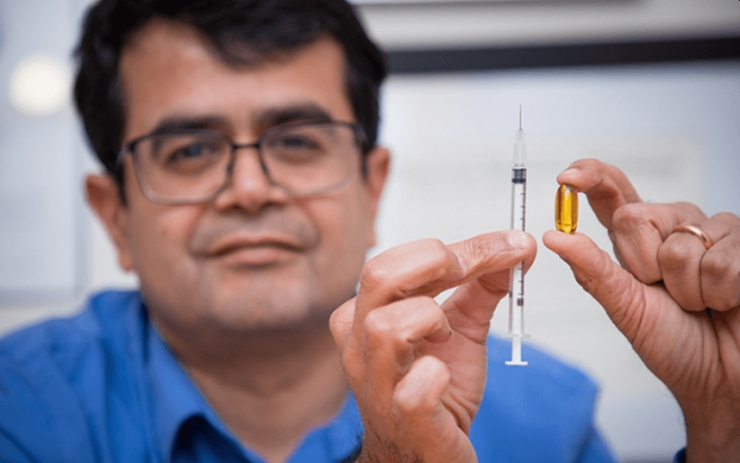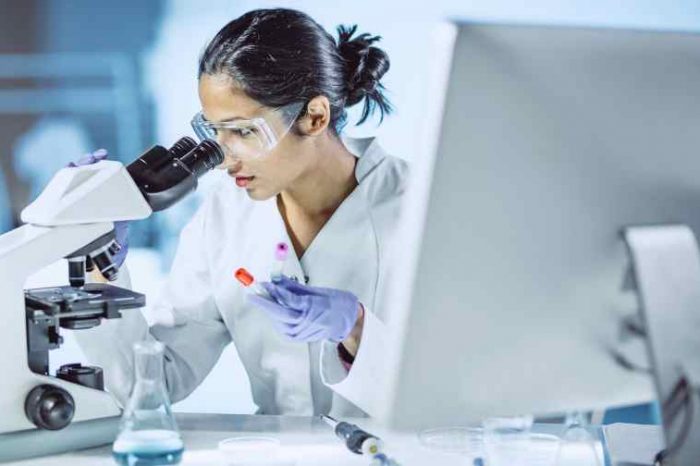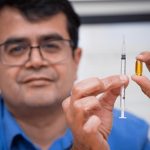Harvard-launched biotech startup i2O Therapeutics launches to replace syringes with pills for oral delivery of many injectable drugs, including insulin

i2o Therapeutics, a Boston, MA-based biotech startup developing a platform for oral delivery of traditionally injectable biological drugs, has launched to commercialize innovations developed at Harvard University that may one day enable patients and clinicians to give up syringes in favor of pills.
Founded in 2019, i2O Therapeutics will initially focus on developing oral formulations for GLP1 analogs, glucagon-like peptides that help balance glucose levels to treat diabetes. Using ionic liquid technologies developed in the lab of Harvard bioengineer Samir Mitragotri, PhD, biologic therapies that would normally need to be delivered via needle may be reformulated and encapsulated as pills for oral delivery.
Harvard’s Office of Technology Development granted i2O Therapeutics an exclusive license to the technology, to develop safe and effective oral formulations for a range of biologics, large molecules, and peptide-based pharmaceuticals. The company has raised $4M in seed funding from Sanofi Ventures and the JDRF T1D Fund to advance its mission, and will initially focus on developing formulations for GLP1 analogs, glucagon-like peptides that help balance glucose levels to treat diabetes.
“Our technology has the potential to enable the oral delivery of high-value drugs in a safer, more effective and patient-friendly way and also by easing the treatment burden for dozens of therapeutics that were previously restricted to intravenous or subcutaneous delivery,” said Mitragotri, who is Hiller Professor of Bioengineering and Hansjorg Wyss Professor of Biologically Inspired Engineering at Harvard John A. Paulson School of Engineering and Applied Sciences (SEAS) and a Core Faculty member at Harvard’s Wyss Institute for Biologically Inspired Engineering.
Three main obstacles typically prevent the administration of protein drugs by mouth. Digestive enzymes in the gut can easily destabilize the molecules; a layer of thin mucus in the gut presents a physical barrier; and the cells lining the wall of the gut have extremely tight junctions that can prevent the transport of proteins. The Mitragotri Lab’s innovations have been shown to overcome all three.
In a 2018 publication in the Proceedings of the National Academy of Sciences, Mitragotri’s lab demonstrated the successful oral delivery of insulin, in animal models, using ionic liquids. “We showed that we can formulate insulin in the ionic liquid, we can stabilize it, and we can get substantial fractions of the delivered dose into blood circulation,” Mitragotri said. The lab received funding and strategic advising from Harvard’s Blavatnik Biomedical Accelerator to further advance and validate the technology. “The translational funding from the Blavatnik Accelerator was very significant, very important to the development of these innovations,” Mitragotri said.
The ionic liquids developed in Mitragotri’s lab are essentially liquid salts, composed of small-ion ingredients that are generally regarded as safe. “By choosing the right ions, you can control the properties, so you can make them more viscous, less viscous, more tissue penetrating, or inert,” he explained. “We pair these formulations up with specific drugs, and we have shown in the lab that a variety of drugs can be delivered, like insulin, including other peptides, small molecules, and antibodies.”
“The primary indications are likely to include diabetes, autoimmune disease, and oncology. Those are the key areas where we see this platform making a strong impact,” Mitragotri added. The technology has the potential to ease the burden of treatment for numerous conditions and improve patients’ overall experience.
“For millions of patients worldwide, a pill would be more attractive than a therapy that needs to be injected. Oral delivery of biologics is a challenge that many engineers and chemists have tried to address, and one that becomes more urgent as modalities trend toward peptide, antibody, and mRNA therapies,” said Isaac Kohlberg, Harvard’s Senior Associate Provost and Chief Technology Development Officer. “Through their years of research efforts and translational support from the Blavatnik Biomedical Accelerator, the Mitragotri Lab has created a unique and innovative drug delivery platform with compelling validational results. We’re pleased that through the launch of this startup, the team will be able to move it to the next stage of development and toward the clinic.”
Several entrepreneurial members of Mitragotri’s Harvard lab have taken up roles at the company. Tyler Brown, PhD ’19, completed his doctoral studies in bioengineering at Harvard SEAS; he is now a Principal Scientist at i2O. Kelly Ibsen, PhD, was a research fellow in the Mitragotri Lab and is now the company’s Director of Research and Strategic Project Management. Mitragotri is a co-founder and board member of i2O and will be a scientific advisor to the new company, which is currently housed at the Pagliuca Harvard Life Lab.
“It’s extremely satisfying to see the technology make this jump from an academic discovery to a company that is moving it forward towards clinical application,” Mitragotri said. “That’s what really drives us as bioengineers, to see our technologies eventually reach and help patients.”

